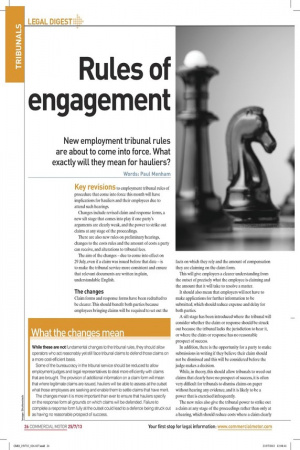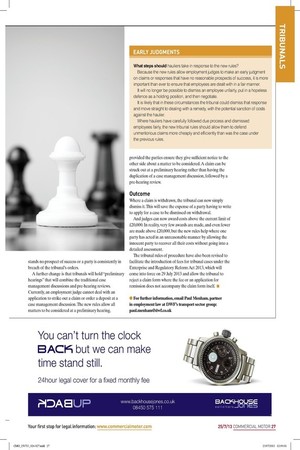Rules of engagement New employment tribunal rules are about to come into force. What exactly will they mean for hauliers?
Page 22

Page 23

If you've noticed an error in this article please click here to report it so we can fix it.
ivoras: Paul Menham Key revisions to employment tribunal rules of procedure that come into force this month will have implications for hauliers and their employees due to attend such hearings.
Changes include revised claim and response forms, a new sift stage that comes into play if one party's arguments are clearly weak, and the power to strike out claims at any stage of the proceedings.
There are also new rules on preliminary hearings, changes to the costs rules and the amount of costs a party can receive, and alterations to tribunal fees.
The aim of the changes — due to come into effect on 29 July, even if a claim was issued before that date — is to make the tribunal service more consistent and ensure that relevant documents are written in plain, understandable English.
The changes Claim forms and response forms have been redrafted to be clearer. This should benefit both parties because employees bringing claims will be required to set out the facts on which they rely and the amount of compensation they are claiming on the claim form.
This will give employers a clearer understanding from the outset of precisely what the employee is claiming and the amount that it will take to resolve a matter.
It should also mean that employers will not have to make applications for further information to be submitted, which should reduce expense and delay for both parties.
A sift stage has been introduced where the tribunal will consider whether the claim or response should be struck out because the tribunal lacks the jurisdiction to hear it, or where the claim or response has no reasonable prospect of success.
In addition, there is the opportunity for a party to make submissions in writing if they believe their claim should not be dismissed and this will be considered before the judge makes a decision.
While, in theory, this should allow tribunals to weed out claims that clearly have no prospect of success, it is often very difficult for tribunals to dismiss claims on paper without hearing any evidence, and it is likely to be a power that is exercised infrequently.
The new rules also give the tribunal power to strike out a claim at any stage of the proceedings rather than only at a hearing, which should reduce costs where a claim clearly stands no prospect of success or a party is consistently in breach of the tribunal's orders.
A further change is that tribunals will hold "preliminary hearings" that will combine the traditional case management discussions and pre-hearing reviews. Currently, an employment judge cannot deal with an application to strike out a claim or order a deposit at a case management discussion. The new rules allow all matters to be considered at a preliminary hearing, Outcome Where a claim is withdrawn, the tribunal can now simply dismiss it. This will save the expense of a party having to write to apply for a case to be dismissed on withdrawal.
And judges can now award costs above the current limit of £20,000. In reality, very few awards are made, and even fewer are made above £20,000, but the new rules help where one party has acted in an unreasonable manner by allowing the innocent party to recover all their costs without going into a detailed assessment.
The tribunal rules of procedure have also been revised to facilitate the introduction of fees for tribunal cases under the Enterprise and Regulatory Reform Act 2013, which will come into force on 29 July 2013 and allow the tribunal to reject a claim form where the fee or an application for remission does not accompany the claim form itself. • • For further information, email Paul Menham, partner in employment law at DVVF's transport sector group: paul.menham@dwf.co.uk










































